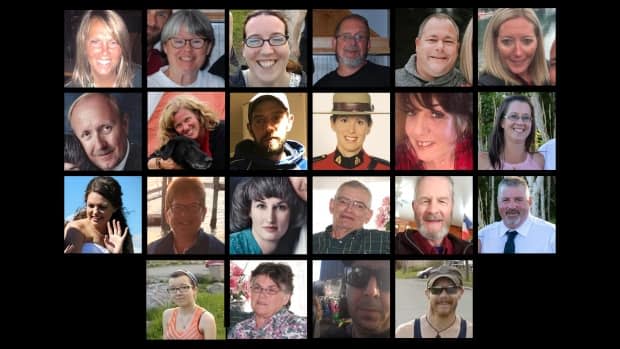3-month delay in N.S. shooting hearings required to brief participants, families: commission

The inquiry looking into the mass shooting and arson rampage that started in Portapique, N.S., in April 2020 says it needs more time to seek input from participants on information it has already gathered about the killings of 22 people.
The Mass Casualty Commission announced late Thursday afternoon that public proceedings scheduled to start Oct. 26 and run for seven weeks at the Halifax Convention Centre will be delayed until the end of January.
Public hearings as part of those proceedings will now begin sometime in February, though an exact date has not been set.
Emily Hill, counsel for the commission, said staff are still conducting witness interviews and gathering information — both from the public and through the disclosure process that has involved subpoenaing organizations like the RCMP.
The plan is to compile that information in documents and share them with the organizations and people who have standing in the inquiry in advance of the public proceedings. That process is underway but it's not complete, Hill said.
"I think we've just come to the realization that we need a little more time to do that work and to do it well," she said.
"We need to know from their point of view if there are gaps or things that we're missing, things we need to correct and do, and get that right so that when we share that information with the public in the new year it is accurate."

The 60 participants in the inquiry include dozens of groups — among them police, firearms organizations, and advocacy organizations that deal with intimate partner violence — as well as people who were most affected by the tragedy.
Rob Pineo, a lawyer presenting the families of people killed, said they are "content with the change in schedule as it provides adequate time for all participants to properly prepare for the proceedings."
1st phase to explore what happened
The first phase of the public inquiry's work is to find out what exactly happened in April of last year when a gunman disguised as a Mountie murdered neighbours, acquaintances and people he encountered while travelling nearly 200 kilometres through rural parts of Nova Scotia.
On Thursday, the commission released a list of the foundational documents it is putting together. They include reports from different crime scenes, such as "Perimetre Containment in Portapique" and "First Responders in Portapique," as well as some focused on a given subject; for instance, how the RCMP's Emergency Response Team responded and the replica police car the gunman drove.

The documents will feature timelines, maps and a breakdown of the sources of information, Hill said.
"What happened when, even where … they'll be fairly comprehensive. We think they will be able to really give people the answers to the questions about what happened," she said.
The commission said it has collected more than 40,000 pages of records and 230 audio and video recordings, in addition to information garnered by speaking to witnesses.
Hill said the commission has been "getting good responses" to its requests for information from the RCMP, and did not attribute the decision to postpone public proceedings to problems receiving disclosure.
'Ongoing conversation' about schedule
As recently as during open houses in affected communities two weeks ago, commission staff said the plan was to start sharing information about their investigation at the end of this month.
Hill said discussions about adjusting the timeline have been ongoing.
"It became clear that the best way to use our time together in the fall, as we do this Phase 1 work of understanding what happened, was to focus on having the opportunity for participants, including families, to share their feedback about the information that they've received and get it ready to be shared with the public," she said.
The revised schedule includes some type of proceedings starting on Jan. 25, 2022, in advance of hearings in February. The hearings will continue into the first days of March.
"In January, we will probably be doing some context setting. So sharing some information that sets the stage to then receive the information that we'll learn about what happened," Hill said.
Examining why and how
At the end of March, the commission's plan is to shift from examining what happened to analyzing why and how the tragedy occurred. A second batch of public proceedings will be held, right up until the inquiry's preliminary report is due in May.
The third phase of the commission's work relates to putting together recommendations to improve public safety. It is scheduled to start the first week of June and run into July.
The final report is set to be released Nov. 1, 2022. The commission's website said it "will contain the commission's findings, lessons learned, and meaningful recommendations to help protect Canadians in the future."
"We're on track to be able to do our work," Hill said. "Part of the reason why we've reorganized our work [this fall] is we're trying to balance that need to meet those expectations, but also not rush. We want to take our time and do the work well at the front end."
MORE TOP STORIES


